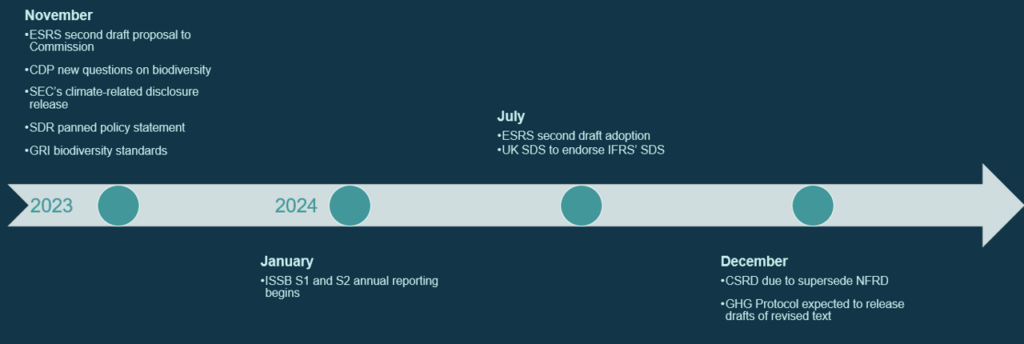ESG Policies and Regulations Update October 2023

The following document details framework updates that occurred in October, as well as highlighting some key updates and releases to be aware of in the coming few years. Frameworks such as those explored in this report can help stakeholders understand how an organisation manages risks and opportunities around such sustainability issues. Often used as a communication tool, it can play an important role in demonstrating the sincerity of a company’s actions as well as ensuring good governance.
The global regulatory landscape has experienced exponential growth in the past few decades, with 647% increase in ESG regulations since the start of the 21st century. In June, global ESG regulations were found to have increased by 155% in the last 10 years. 1,255 ESG regulations have been introduced worldwide since 2011 yet to compare, only 493 regulations were published in the 9 years from 2001 to 2010.
October 2023 Update
The general observed trends within frameworks include a growing focus on disclosure, regarding both data and strategy, as well as an increased engagement of supply chains. Climate impacts are also seeing greater levels of inclusion into regulations and policies.
| Framework | Update | Date |
|---|---|---|
| UK Taxonomy | The Green Technical Advisory Group (GTAG) has issued final advice to the UK government on the creation of a UK Green Taxonomy. | 5 Oct 2023 |
| UK ETS (Emission Trading Scheme) | The UK Government will issue its lowest-ever level of carbon allowances to energy-intensive industries in 2024, as 12.4% fewer carbon permits will be auctioned. This is a result of seeking to align the ETS with its 2050 net-zero target. | 6 Oct 2023 |
| Transition Plan Taskforce (TPT) | The TPT has delivered a ‘gold standard’ disclosure framework for corporate climate transition plans, aligning to globally recognised reporting frameworks and standards. Further information is below. | 9 Oct 2023 |
| CSRD | The European Commission has announced plans to delay key aspects of the CSRD by 2 years. This includes the adoption of requirements for companies to provide sector-specific sustainability disclosures and for sustainability reporting from companies outside of the EU. | 18 Oct 2023 |
The TPT’s Gold Standard
As guidance for corporate climate disclosures, the TPT has stated that a company’s transition plan should take a strategic approach, explaining how it will meet climate targets, manage climate-related risks and contribute to achieving net-zero. The TPT has proposed that companies should publish one transition plan this year, and an update in 2026. This means 2024 and 2025 should be used to include information material to the plan in its financial reporting. The recommendations build on the ISSB’s S2 as well as using the work of the Glasgow Financial Alliance for Net Zero (GFANZ). The TPT has reiterated that its recommendations should provide additional recommendation from TCFD and ISSB on what a good practice climate transition should look like.
Upcoming Changes

| Date Expected | Framework | Description |
|---|---|---|
| Mid-late 2023 | SDR | Planned policy statement confirming SDR rules |
| Mid-late 2023 | GRI | New GRI Biodiversity Standards expected to be published |
| Mid-late 2023 | SEC’s climate-related disclosures | Issuance of a finalised Climate Disclosure rule delayed until ‘fall’ |
| November 2023 | CSRD | EFRAG to propose a second draft of ESRS to the Commission that will include standards for sectors, non-EU companies, and listed SMEs; voluntary guidance for non-listed SMEs; amendment to the first draft to implement a cap on value chain emissions |
| 2023 | CDP | New questions to be released on biodiversity, requesting Board level oversight, public commitments, the impact of the value chain, actions to progress the topic, indicators and related publications |
| July 2024 | CSRD | Anticipated adoption of the second draft of ESRS |
| July 2024 | UK SDS | Secretary of State for Business and Trade will consider the endorsement of the IFRS Sustainability Disclosure Standards, to create the UK SDS |
| 2024 | CSRD | Due to supersede NFRD in 2024. Large companies already subject to NFRD must begin reporting on the fiscal year 2024. |
| 2024 | GHG Protocol | Expected to release drafts of revised text |
| 2025 | GHG Protocol | Final standards and guidance to be released |
Implications
Looking ahead, alignment of regulatory initiatives, harmonisation of targets and more standardised data will be needed to help improve transparency and enable companies to achieve their decarbonisation targets. The underlying principles new regulations and ratings due to align to are the ESRS and ISSB.
As a result, companies should be reviewing and aligning to the ISSB’s Standards and the ESRS. Initially, a gap analysis should be conducted to identify missing data and information as well as giving an opportunity to make roles and responsibilities clear to all personnel involved – upskilling may be required. Ensuing this, improving the accuracy of data should occur, accompanied by an internal report in preparation for public reporting once UK compliance requirements have been released.
How we can help
We can support you and your organisation navigate the complexities of voluntary and mandatory reporting, as well as the regulatory frameworks around sustainability. Please contact us to speak to one of our experts.
Abbreviations
CDP – (formally) Carbon Disclosure Project
CSRD – Corporate Sustainability Reporting Directive
ESRS – European Sustainability Reporting Standards
GHG Protocol – Greenhouse Gas Protocol
GRI – Global Reporting Initiative
ISSB – International Sustainability Standards Board
NFRD – Non Financial Reporting Directive
SDR – Sustainability Disclosure Requirements
TCFD – Taskforce for Climate Related Disclosure
TNFD – Taskforce for Nature Related Disclosure
TPT – Transition Plan Taskforce
UK SDS – Sustainability Disclosure Standards
UK ETS – Emission Trading Scheme



